Key takeaways:
- Dyslexia is a learning disability affecting reading and language processing, unrelated to intelligence, and often accompanied by strengths in creativity and problem-solving.
- Raising awareness of dyslexia fosters inclusivity in educational environments and supports individuals by promoting understanding and effective teaching strategies.
- Dyslexia training programs equip educators and parents with tools and methods, emphasizing early intervention and ongoing support for learners.
- User-friendly design, diverse resources, and community features on dyslexia websites enhance the navigation experience and provide vital support networks for individuals with dyslexia.
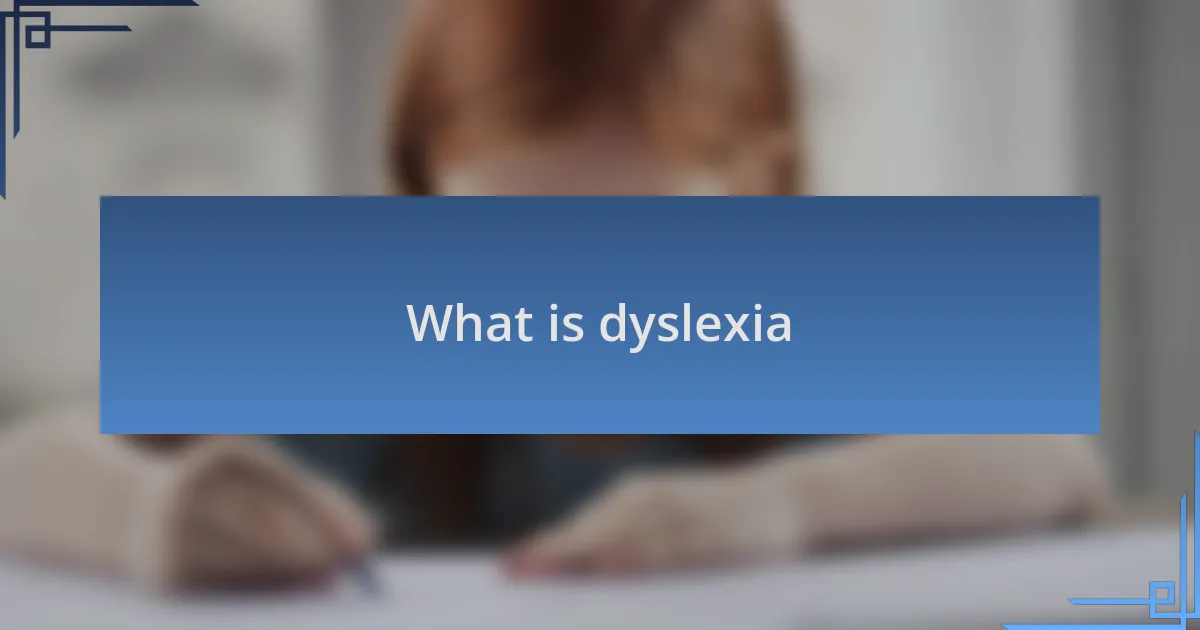
What is dyslexia
Dyslexia is a specific learning disability that primarily affects reading and language processing skills. I remember when I first learned I had dyslexia; it was a relief, yet also overwhelming. It helped to finally put a name to the struggles I faced with reading, spelling, and sometimes even speaking.
At its core, dyslexia is not about intelligence; it relates to how the brain processes written information. Many people with dyslexia may be highly creative or excel in areas not tied to traditional academics. Have you ever wondered why some individuals with dyslexia are often exceptional problem solvers or have remarkable talents in art or music? From my experience, these skills often arise from the different ways we engage with the world around us.
Struggling with dyslexia can lead to frustration and self-doubt, especially when it feels like everyone else is zipping through their reading assignments or writing essays effortlessly. During my school years, I often found myself staring at the page, feeling lost. It took time and support to build my confidence, but I learned that dyslexia is just one aspect of who I am—and it doesn’t define my potential. So, how can we redefine the conversation around dyslexia to highlight strengths? It starts with understanding and acceptance, both for ourselves and others navigating similar journeys.
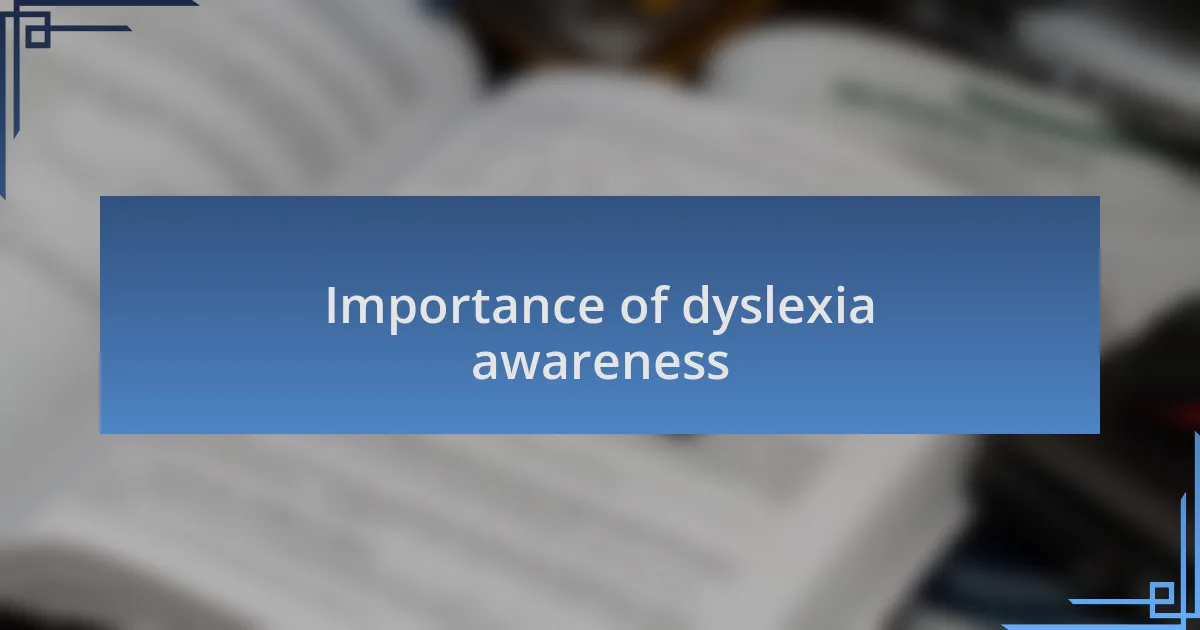
Importance of dyslexia awareness
Understanding the importance of dyslexia awareness is crucial for fostering an inclusive environment. I remember sitting in a classroom, feeling isolated when my peers seemed to have a handle on their reading. When educators and parents are aware of dyslexia, they can implement strategies that support diverse learning needs, creating a space where every child feels valued and understood.
Awareness not only informs teaching practices but also destigmatizes the experience of those with dyslexia. For instance, sharing my story opened doors to discussions about accommodations that can make learning more accessible. Have you ever noticed how a simple adjustment, like allowing additional time for reading assignments, can make a significant difference? Awareness empowers those of us with dyslexia to advocate for ourselves and others, promoting a culture of empathy and understanding.
Moreover, raising dyslexia awareness can lead to better resources and support systems within communities. I distinctly recall attending a workshop where parents were educated about dyslexia, and it felt like a weight had been lifted. When communities are educated about how dyslexia affects learning, they can offer more effective support, which can be life-changing for individuals like me navigating their educational journey. Understanding our challenges helps to ensure that children with dyslexia don’t struggle alone.
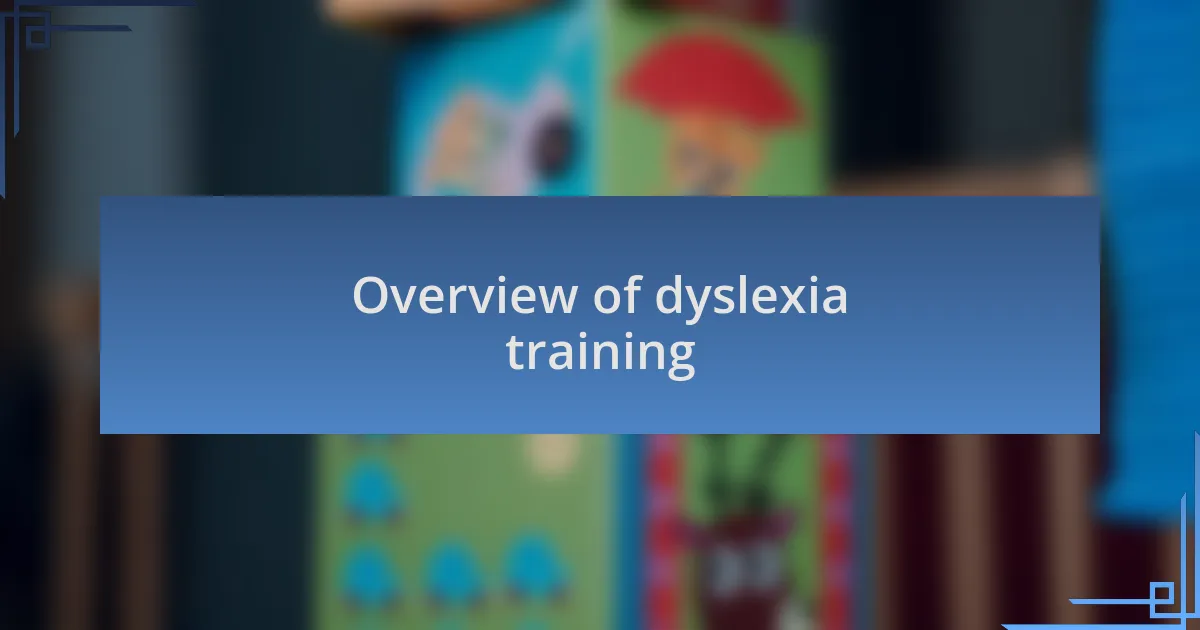
Overview of dyslexia training
Dyslexia training programs focus on equipping educators and parents with effective strategies to support learners with dyslexia. From my experience, these programs delve into various teaching methods, including multisensory approaches, which cater to different learning styles. Have you ever considered how engaging multiple senses can enhance comprehension? I found that when lessons incorporated visual, auditory, and kinesthetic learning techniques, I absorbed information more effectively.
Furthermore, dyslexia training often emphasizes the importance of early intervention. I vividly remember the moment when a teacher recognized my struggles and sought specialized training to help. That proactive approach transformed my learning experience. For many, early support through tailored strategies can be the difference between ongoing frustration and a path to success. Training ensures educators are not just aware of dyslexia, but also equipped to implement change in the classroom.
Lastly, ongoing support and resources are essential components of effective dyslexia training. I’ve attended numerous workshops that offered not just theoretical knowledge, but practical tools and community connections. It’s invaluable to meet others who share similar experiences, building a network that fosters encouragement and growth. Have you ever left a training feeling inspired and empowered? Those moments are crucial—they remind us that we are not alone on this journey.
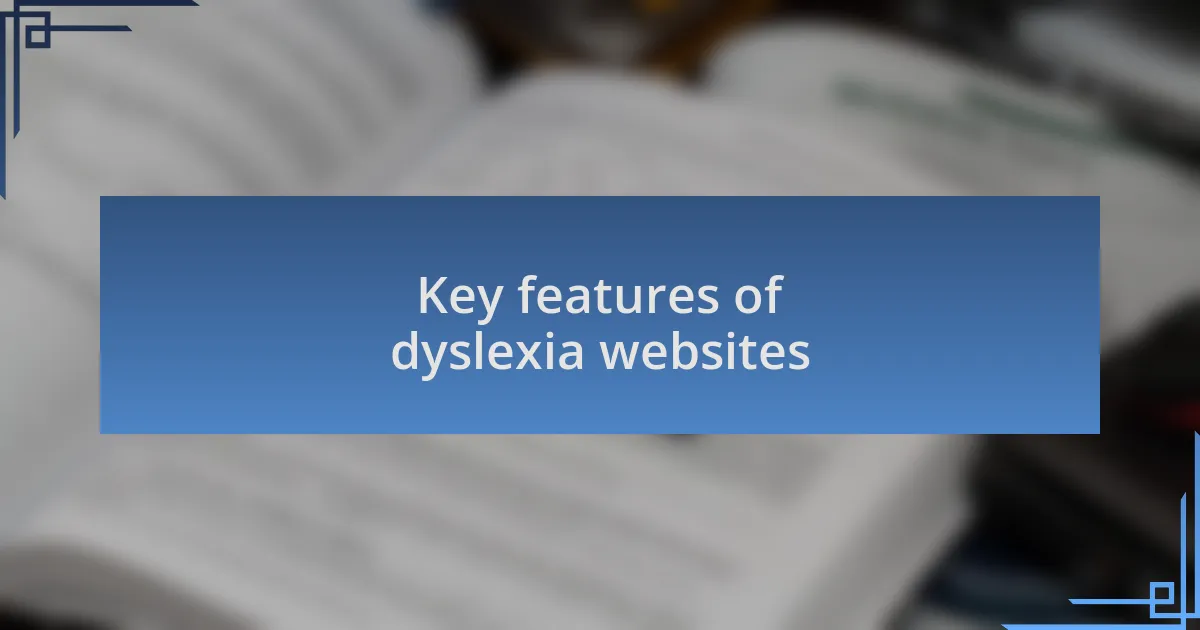
Key features of dyslexia websites
When navigating dyslexia websites, one key feature that stands out is their user-friendly design. I remember the first time I stumbled upon a site with clear navigation and an intuitive layout—it felt like a breath of fresh air. Have you ever visited a website that just makes sense? The ease of finding resources or helpful articles can transform a frustrating search into an enlightening experience.
Another important aspect is the presence of varied resources tailored to different needs. From interactive guides to downloadable materials, I found that websites offering a mix can be incredibly beneficial. It’s like a toolbox—having multiple tools at your disposal can help tackle challenges from various angles. Have you ever tried using a one-size-fits-all solution only to feel like it wasn’t quite right? I certainly have, and it reminded me how crucial it is for dyslexia resources to cater to individual learning styles.
Supportive community features, such as forums and discussion groups, are invaluable as well. I still recall connecting with others who faced similar hurdles; it was a reminder that we’re not alone. Engaging in discussions and sharing experiences foster connection and understanding. Isn’t it comforting to realize there are others navigating similar paths? Those shared insights can illuminate the way forward and motivate those on their journey.
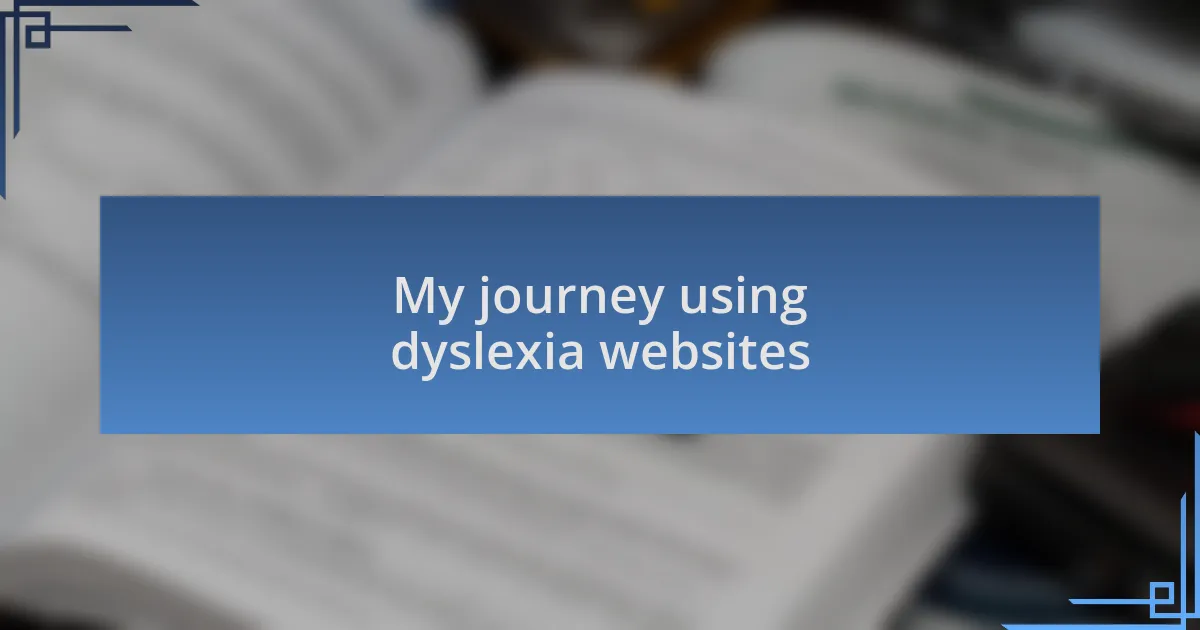
My journey using dyslexia websites
Diving into the world of dyslexia websites was like opening a door to a library full of secrets just waiting to be uncovered. I vividly remember the moment I found a site that not only explained dyslexia in detail but also offered practical strategies that resonated with my experiences. Have you ever felt a sense of relief when you finally find information that makes everything click into place? For me, that was a pivotal moment on my journey.
Over time, I started to notice how certain resources tugged at my heartstrings more than others. One particular website offered personal stories that mirrored my struggles, and reading them felt like sitting down with a friend who truly understood. Isn’t it amazing how shared experiences can validate your feelings and remind you that you’re not alone in your battle? Those stories inspired me not just to persevere but also to embrace my unique path.
As I navigated through forums, I often encountered questions that echoed my own uncertainties. I distinctly recall sharing my thoughts on a thread, hesitantly at first, but soon realizing the power of vulnerability in connecting with others. Have you ever shared something personal only to discover that many others feel the same way? It was through these exchanges that I built my own supportive network, drastically changing the way I approached my learning journey.
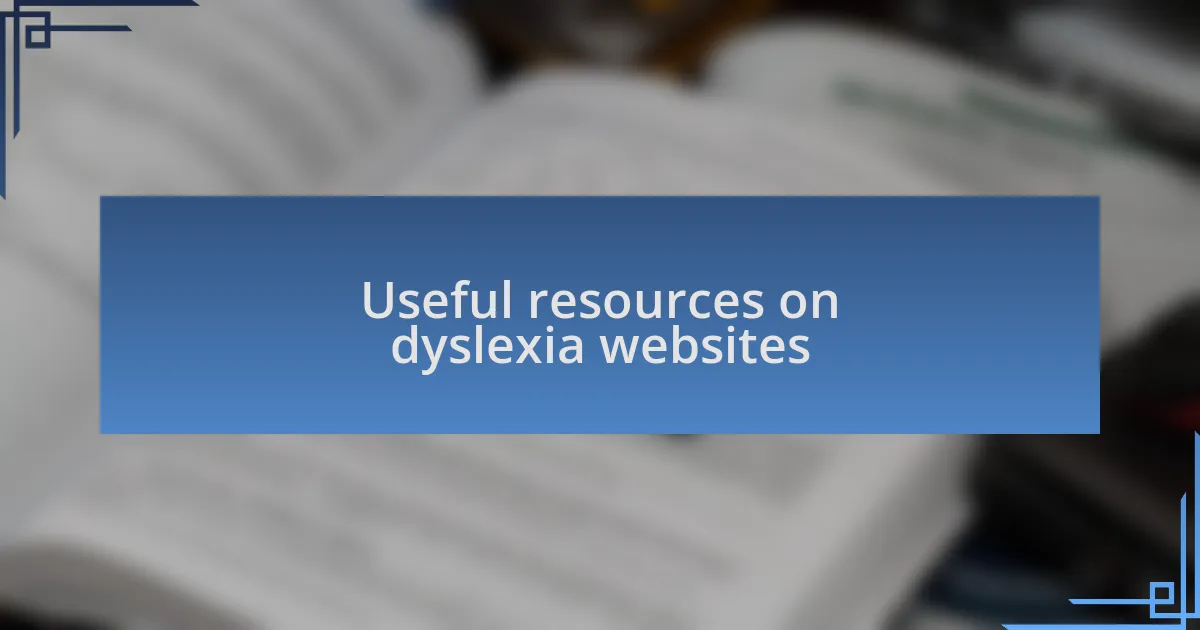
Useful resources on dyslexia websites
Navigating dyslexia websites revealed treasure troves of resources that truly enriched my understanding. I stumbled upon interactive tools designed for practice and learning, such as engaging games that transformed tedious exercises into enjoyable experiences. Have you ever found joy in learning through play? That’s exactly how I felt, taking a break from traditional study methods and seeing real progress.
Another significant resource was a collection of video tutorials from educators who had firsthand experience with dyslexia. Watching these videos not only provided me with effective strategies but also sparked a sense of hope. It was reassuring to hear successful individuals share their journeys. Don’t you find it empowering when someone else’s triumph lights the path for your own?
Lastly, I can’t overlook the webinars I attended, where experts discussed various aspects of dyslexia. Listening to their insights sparked countless ‘aha’ moments for me. I remember one session where an expert shared practical tips on overcoming reading difficulties, which felt like a light bulb moment in my understanding. Have you ever experienced a similar revelation that altered your approach? These resources collectively shaped my experience, guiding me through the complexities of dyslexia with newfound confidence.
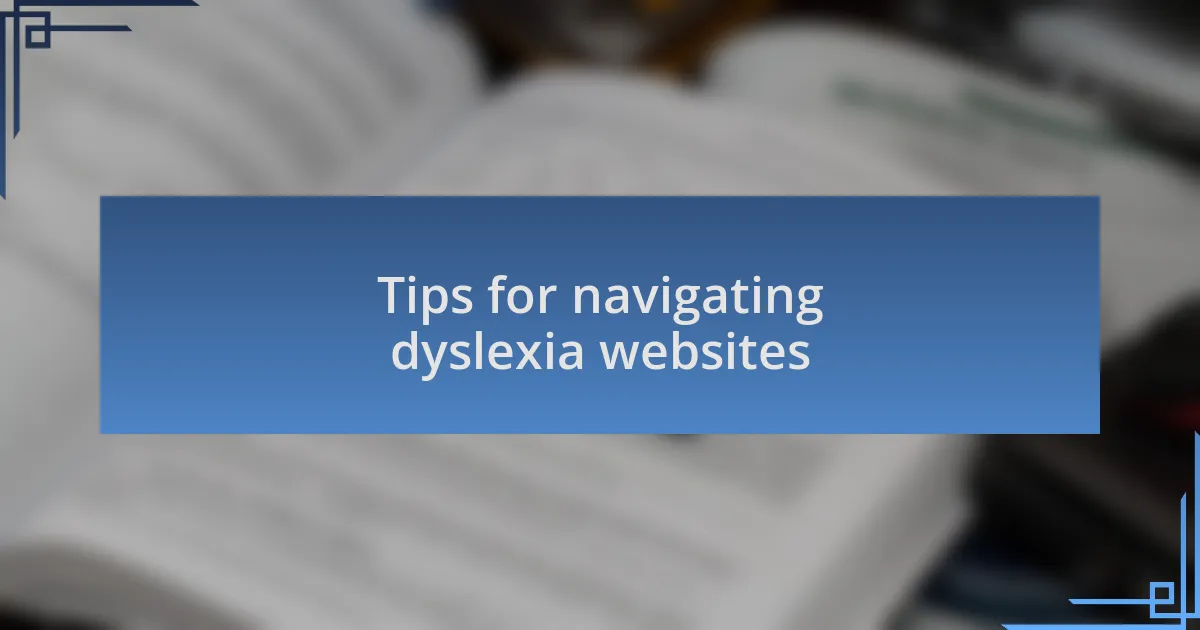
Tips for navigating dyslexia websites
When navigating dyslexia websites, I found that using clear filters and categories made a world of difference. Early on, I felt overwhelmed by the amount of information available, but focusing on specific topics I needed at the moment helped streamline my search. Have you ever felt stuck in an information overload? I certainly have, and breaking it down made the process feel much more manageable.
I also discovered the importance of bookmarking useful pages. There were times when I’d come across helpful articles, only to lose them in the sea of browsing. By creating a little library of my favorite resources, I could easily return to valuable content that resonated with me. Have you ever wished you could retrieve that one article that seemed perfect at the time? Trust me, keeping a dedicated space for go-to links is a game changer.
Lastly, I found engaging with community forums to be incredibly beneficial. Sharing my experiences and connecting with others facing similar challenges created a sense of belonging. It was in these spaces that I found not just advice, but camaraderie. Have you ever connected with someone who just gets it? That’s what makes the journey less isolating and fosters growth.